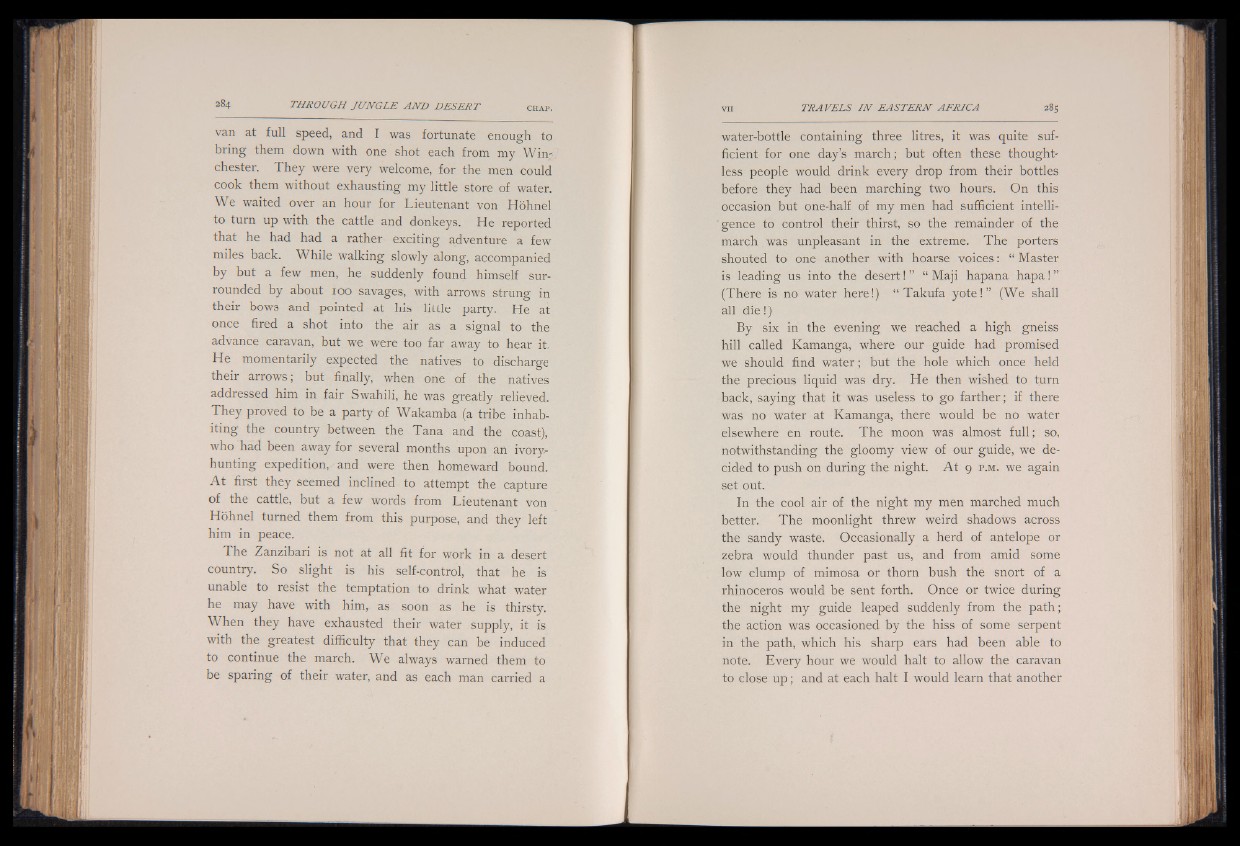
van at full speed, and I was fortunate enough to
bring them down with one shot each from my Win-<
Chester. They were very welcome, for the men could
cook them without exhausting my little store of water.
We waited over an hour for Lieutenant von Hohnel
to turn up with the cattle and donkeys. He reported
that he had had a rather exciting adventure a few
miles back. While walking slowly along, accompanied
by but a few men, he suddenly found himself surrounded
by about 100 savages, with arrows strung in
their bows and pointed at his little party. He at
once fired a shot into the air as a signal to the
advance caravan, but we were too far away to hear it.
He momentarily expected the natives to discharge
their arrows; but finally, when one of the natives
addressed him in fair Swahili, he was greatly relieved.
They proved to be a party of Wakamba (a tribe inhabiting
the country between the Tana and the coast),
who had been away for several months upon an ivory-
hunting expedition, and were then homeward bound.
A t first they seemed inclined to attempt the capture
of the cattle, but a few words from Lieutenant von
Hohnel turned them from this purpose, and they left
him in peace.
The Zanzibari is not at all fit for work in a desert
country. So slight is his self-control, that he is
unable to resist the temptation to drink what water
he may have with him, as soon as he is thirsty.
When they have exhausted their water supply, it is
with the greatest difficulty that they can be induced
to continue the march. We always warned them to
be sparing of their water, and as each man carried a
water-bottle containing three litres, it was quite sufficient
for one day’s march; but often these thoughtless
people would drink every drop from their bottles
before they had been marching two hours. On this
occasion but one-half of my men had sufficient intelligence
to control their thirst, so the remainder of the
march was unpleasant in the extreme. The porters
shouted to one another with hoarse voices: “ Master
is leading us into the desert! ” “ Maji hapana hapa! ”
(There is no water here!) “ Takufa yo te !” (We shall
all die!)
By six in the evening we reached a high gneiss
hill called Kamanga, where our guide had promised
we should find water; but the hole which once held
the precious liquid was dry. He then wished to turn
back, saying that it was useless to go farther; if there
was no water at Kamanga, there would be no water
elsewhere en route. The moon was almost fu ll; so,
notwithstanding the gloomy view of our guide, we decided
to push on during the night. A t 9 p .m . we again
set out.
In the cool air of the night my men marched much
better. The moonlight threw weird shadows across
the sandy waste. Occasionally a herd of antelope or
zebra would thunder past us, and from amid some
low clump of mimosa or thorn bush the snort of a
rhinoceros would be sent forth. Once or twice during
the night my guide leaped suddenly from the path;
the action was occasioned by the hiss of some serpent
in the path, which his sharp ears had been able to
note. Every hour we would halt to allow the caravan
to close u p ; and at each halt I would learn that another